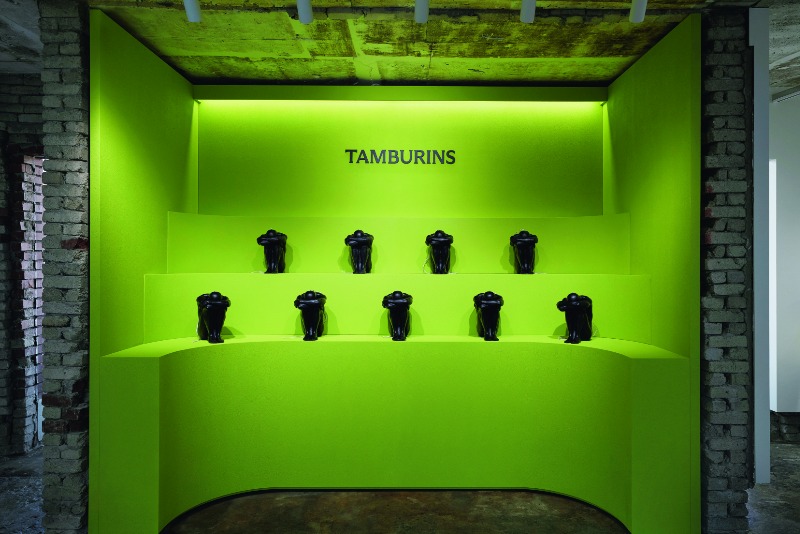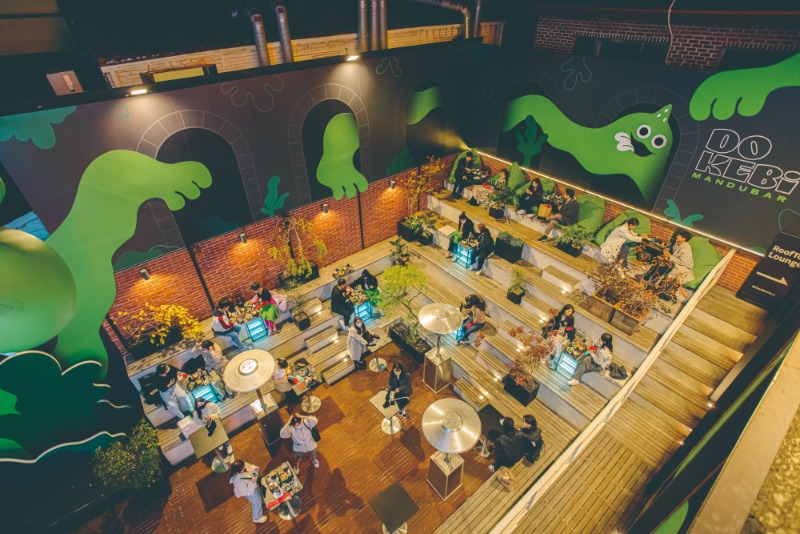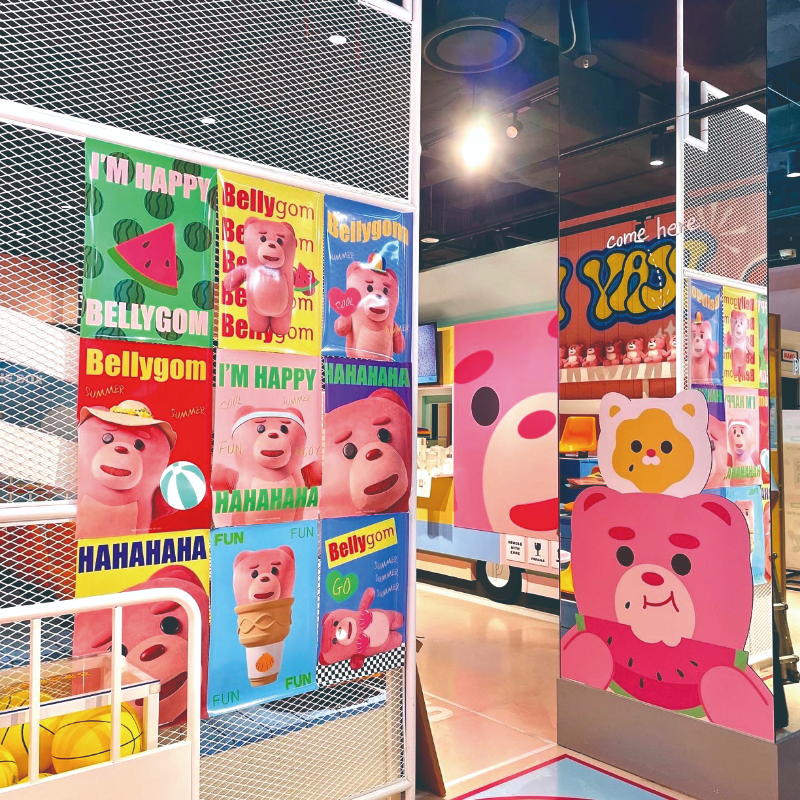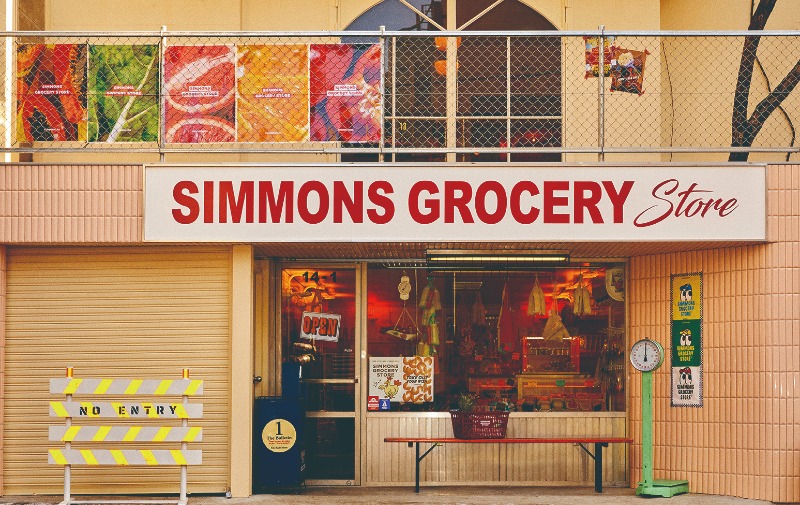Offline shopping has regained popularity now that most COVID restrictions have been lifted. New pop-up stores are opening virtually every day as consumers seek to explore products in person. To further their appeal, they are injected with an atmosphere of fun and entertainment.

Tamburins, a cosmetics brand, collaborated with BLACKPINK’s Jennie to launch its first perfume. The retailer’s marketing campaign, “Solace: A Ray of Comfort,” stressed the connection between fragrances and feelings.
© TAMBURINS
On a June morning hundreds of people waited outside a store in Cheongdam-dong, an upscale part of southern Seoul. The first person in the serpentine queue had arrived at 11 p.m. on the previous day. The second person came at 6 a.m., five hours before the “open run,” when waiting customers would rush in to be the first buyers of NOS7, a fashion brand launched by football star Son Heung-min.
The pop-up store was a new addition to the rapid proliferation of temporary retail sites that opened after the lifting of most COVID restrictions in Korea in the first half of May 2022. These stores have been tapping into consumers’ desire to freely go out and socialize and enjoy a traditional shopping spree instead of buying things online. Even previously reluctant businesses, including appliance makers, are eagerly using pop-up stores to introduce innovative products and services.
EXPANDED CONCEPT

Bibigo and Jeju Beer teamed up to introduce “Dokkaebi Mandu Bar” where beer is served with dumplings (mandu). The pop-up store gives Generation MZ a chance to enjoy new tastes and foreigners an opportunity to sample Korean food.
© CJ CheilJedang
Pop-up stores are not new to Korea. They began to appear before 2010 and soon became a favored marketing vehicle for the apparel and cosmetics industries. The primary ive then and now is to gauge consumer responses before the official launch of new products. Companies use pop-ups as an opportunity to tweak products and sales expectations before their offerings officially hit the market. These days, businesses are turning pop-up stores into fun-filled retail events with character merchandise, food and photo spots.
Pop-up stores that of fer a special, new experience have become a particularly effective way to reach consumers of Generation MZ – the Korean term for millennials plus Generation Z – who value individuality and rarity and often share their experiences with others on social media.
K-pop management has jumped on the trend. For example, a pop-up store for the boy band Stray Kids had a turnout like the rush for NOS7 apparel. An early-morning queue stretched from Yeouido subway station to The Hyundai Seoul, a department store with a dedicated pop-up zone. Over 17 days, “Stray Kids x SKZOO Pop-up Store ‘The Victory’ in Seoul” was filled with animal characters based on the members of the band alongside the band’s merchandise, music and videos.
The short duration of pop-up stores is in pace with the K-pop artists’ changing styles, which tend to have a relatively short life. The hope is that “fansumers” (fans + consumers) will share their experiences at flash retail events on social media, generating further buzz for the group.
By far the most popular pop-up event of 2022 was “Amazing Bellygom,” which was devoted to the pink teddy bear and YouTube character Bellygom, d by Lotte Home Shopping in 2018. In April, a 15-meter high Bellygom bear was installed in front of Lotte World Tower in Seoul, which reportedly attracted more than three million visitors in one month. Buoyed by the huge popularity, Lotte Duty Free hosted a second Bellygom pop-up event in July.Furthermore, international awareness of Bellygom – over 40 percent of the 300 million views on YouTube were generated outside of Korea – prompted Lotte to take the teddy bear to Berlin, Germany, and to New York to help promote the Korea Brand Expo, which was held there in September.
COLLABORATING FOR FUN

“Amazing Bellygom,” an event devoted to the pink teddy bear and YouTube character Bellygom, was the most popular Korean pop-up event in 2022, drawing 3.25 million visitors. International awareness of Bellygom prompted its organizers to take the teddy bear to New York.
© bellygom
As pop-up stores multiplied in 2022, collaborations between businesses came to the fore. For the sake of fun and popularity, some businesses are not reluctant to work with rival brands and bring their products into their own pop-up stores. Notable are “mix & match” stores, or hybrid product collections made by companies of different styles.
The convenience store chain emart24 opened a pop-up store named “emart24 Geumseong Branch” in collaboration with LG Electronics, a home entertainment and appliance maker. The project was conceived by emart24, which had been conducting a “space marketing” campaign, after discovering the common factor “Geumseong” (Korean name for the planet Venus) in LG Electronics’ “Geumseong Oraksil,” a modernized take on the retro game arcade. Customers could enjoy a caffè latte and cupcakes offered by emart24 while playing mobile games on LG devices.
SK Innovation, an energy company, opened “SK Juyuso” to celebrate its 60th anniversary and promote its history and future vision. In Korean, juyuso means “gas station,” and the first syllable ju can refer to both gasoline and alcohol, as in soju. The pop-up store offered craft beers with names such as “Gasoline-Lager,” “Premium Gasoline- IPA,” “Crude Oil-Stout” and “Diesel-Weizen,” and served fried chicken in miniature oil drums. Beer dispensers in the shape of gas pumps were a big hit.
Joining hands with Jeju Beer, CJ CheilJedang launched “Dokkaebi Mandu Bar,” where beer was served with dumplings (mandu), under the slogan “Mix It Up!” The dumplings were given names such as “Dokkaebi Bul Mandu” (fire-grilled or spicy-hot) and “Dokkaebi Supmandu,” based on CJ CheilJedang’s flagship product “Bibigo Mandu.” Jeju Beer introduced a limited edition of “Kimchi Sour Beer.” There were photo zones with green and blue lights emitting from fluorescent lamps at various corners of the bar, and dishes that were offered only at the event. Along with food and drink, customers received souvenir red silk gloves, recalling the rubber gloves that are usually worn when making kimchi.
SETTING UP
With pop-up stores, also known as “flash retailing,” becoming increasingly popular, companies that put them together have emerged. These pop-up platforms search for ideal store locations and spaces and facilitate rentals, draft business plans, suggest concepts, and design interiors and plan events. Some even operate their own spaces devoted to flash retail and other events.
Generally, companies set up their own pop-up stores in busy areas such as tree-lined Garosugil in the southern part of Seoul, Seongsu-dong, the Brooklyn of Seoul, or Hongdae (Hongik University area), which is always crowded with young people. But companies lacking the brand power or resources to open a temporary retail space on their own will turn to pop-up platforms for help or share a space with other brands.
Many property companies that lost long-term retail tenants because of prolonged COVID shutdowns are now getting cash-f low relief through short-term pop-up store leases. For the time being, the demand is forecast to continue, as retail decision-makers are expected to introduce an even wider variety of pop-up events. For companies, they present a chance to update their image and enhance recognition, and for young “funsumers” the stores satisfy their thirst for something new.

When it comes to the trendiest pop-up stores in Korea, Simmons, a bedding company, scores high without even showing bedroom items. Its grocery store gave visitors a glimpse of Simmons’ concept of socializing. It surprised visitors by the way it used atypical packaging to disguise products.
© SIMMONS